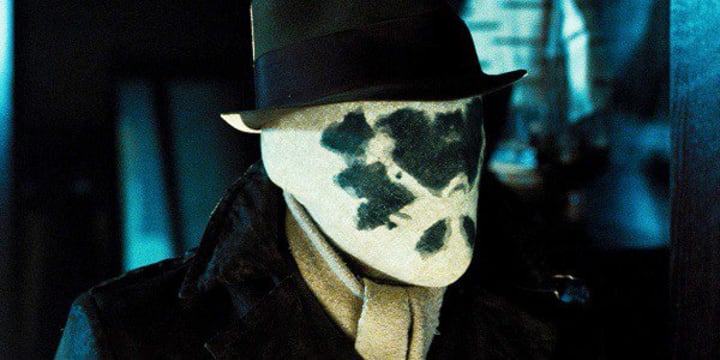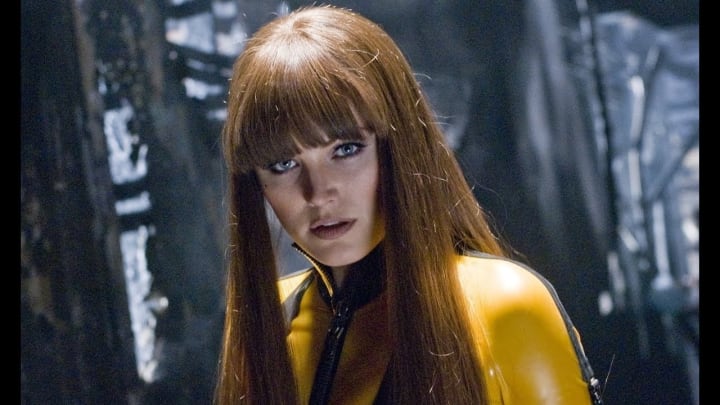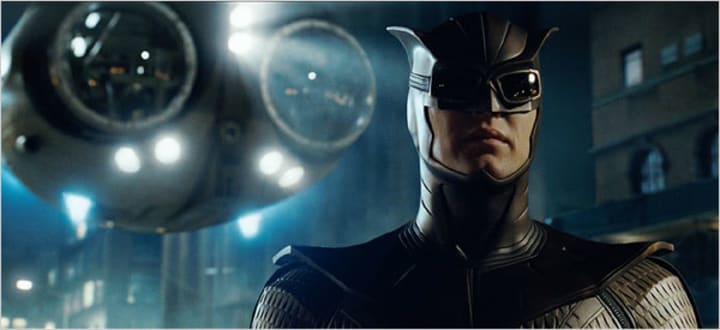Watching the 'Watchmen'—Part 1
A two-part analysis of both the Alan Moore graphic novel and Zack Snyder film by discovering why this story is so effective and how it begins and ends with it's characters.

“Who watches the Watchmen?”
This four word question painted on a TV store’s window asks the simplest of questions; however, it opens up many doors that grant us access to those answers. Who keeps them in check? Do we? Do they? How can a group of super people be let loose without oversight, without restrictions? If they monitor us, who monitors them? This, among many other questions amidst those rooms that the doorways lead are at the very heart of Watchmen.
It’s a sprawling tale with loads of ground that it wants to cover regarding its history changing world and roster of characters. The Ultimate Cut’s 3.5 hour runtime is imposing, but it’s paced so incredibly well because it seeks to work in tandem with the novel it’s envisioning. Considering the novel already did most of the work, Snyder just had to take the time to explore all of the significant aspects of this story. Including the grim and grisly Tale of the Black Freighter and how that relates to Dr. Manhattan’s existential crisis on Mars. To maintain a level of stability and focus, my intentions are to recap each character’s journey in their own secular paragraphs, and to wrap it up in the end. So stick around, grab a drink, grab a snack, and let’s play our role as we watch the Watchmen.
Walter Kovacs/ Rorschach

“Never compromise. Not even in the face of Armageddon.”
Arguably the most beloved character in this story, Rorschach represents this morally grey world’s conflict with one’s self. In many ways, Rorschach is ultimately the amalgamation of various other characters’ journey and thematic purpose that is relevant to their specific arc. Like The Comedian, he’s sort of a nihilist, and he works as an antithesis to what Dr. Manhattan represents. Where Dr. Manhattan pulses a blue aura and is capable of searching the vastness of the universe in the blink of an eye, Rorschach is drenched in brown and scouring the streets, ridding the world of it’s filth. Essentially, despite Manhattan’s immortality, Rorschach is the guy who is the one really dealing with the hard work, or is he? More on that later.
The rorschach test sequence after Walter Kovacs is revealed to be the masked “menace,” works almost as a form of catharsis and avenue for empathy regarding this morally conflicted character. Mentally and physically abused in his earliest years, Walter was created from the world around him, much like all of these characters are. As a means to release that pent up anger and trauma, he hides behind a blotched mask that takes multiple, inexplicable forms. Like the test itself, this mask represents how we view those cards. What experiences do we have that dictate our perception of this inexplicable blotch? Why does this card look like a butterfly to me, but a dead dog to another?
This is Rorschach’s face. Walter Kovacs is quantifiable. Smelly, ugly, rough, and sporting red hair. Rorschach is a mystery. A riddle. An identity that is read based only on experience and perception. That’s what makes Rorschach a character so beloved and iconic to many. He represents everything morally grey about the world he is apart of. He’s brutal, he’s wicked, he’s nihilistic, but is that really the man behind the mask, or did the world create that mask? It’s all a matter of our own personal experiences with that test, and this is subtly explored when Rorschach and Daniel mention their lengthy partnership in crime fighting. There’s a level of respect and understanding between each other that is absent in his relationship with Silk Spectre II, Dr. Manhattan, or The Comedian.
Edward Blake/ The Comedian

“What happened to the American dream? It came true. You’re looking at it.”
This quote so greatly defines this genuinely upsetting character. The death of The Comedian starts this story, but it’s in the flashbacks that we see the face of the American dream reconfigured. A dream that has repeatedly mirrored the radius of freedoms offered to its citizens, but The Comedian’s existence parodies those freedoms and complete jurisdiction by abusing those powers. Whether it’s sexual and physical abuse, killing rioters, policing in foreign countries, having a complete lack of empathy for human life in general, The Comedian is a character that works better now than he ever did.
The Comedian is a brash and bold individual who feels as if he is owed the world because of his heroic privileges. Someone who took the dream of exercising constitutional rights and stretching those to the absolute limits to police its citizens. This type of behavior sounds familiar, rings soundly, and sometimes deeply troubles me at how eerie some personalities parallel this character. He is someone I feel the least amount of empathy for, and isn’t someone like Rorschach who was created because of the world around him. The Comedian is someone who viewed the world through a particular lens and tried to mold it to fit that perception of his toxic tendencies so he could pass it off as a joke.
It’s his first line in the movie where he speaks through a mouth full of blood and awareness to the inevitability of this violent altercation by trying to say it’s some crude joke. It isn’t a joke, it’s just the harsh reality. Which is what many personalities today seem to do themselves. They take their harsh, prejudiced critique on the world and try to pass it off as a joke that other people forced them to be the terrible people they are. Their excuse is that they can’t recognize their own mistakes and they unleash their frustrations on people because they are insecure about themselves. The Comedian is aware that he is a terrible person, and sometimes tries to make those meaningful connections to people, but due to a history fueled by violence, rape, and murder, it’s hard to find any way to empathize with someone who is incapable of empathizing with anyone other than their privileged selves.
Laurie Juspeczyk/ Silk Spectre II

“I’m used to going out at 3 AM and doing something stupid.”
Malin Akerman’s Silk Spectre II seems to be the consensus’ ultimate agreement that her performance is the weakest link of the film. Although I agree with this sentiment, the character itself still has a resounding place in the narrative with profound effect. Although not nearly as powerfully feminine as most of Zack Snyder’s other female characters, she still acts as a pivotal role in the narrative to draw out the themes within the story. With the world fringing on an apocalypse due to nuclear tension between the United States and Russia, she finds herself caught with a personal struggle of self identity in a world dominated by masculinity. What’s most striking about her, besides her notably good looks, is that she is on the younger side of life. With her mother urging her to take on the Silk Spectre persona, Laurie finds herself forced into a scenario where the world is on the brink of making superheroes obsolete.
The image of Silk Spectre resides in sex appeal, and it’s showcased through the male gaze of the characters in the film, not Zack Snyder. In many ways, Silk Spectre is a character who is hypersexualized in the same way that Batgirl, Black Canary, and many other female heroines have been in comics throughout the years. Moore and Snyder each found a way to give that hypersexualization meaning, and gave it more personal depth to make Laurie a three-dimensional character beyond her looks. What’s most fascinating about Laurie as a character, is that she has complete control over her life and her body in a world that doesn’t want her to. In a complicated relationship with Dr. Manhattan, the distant, burning blue figure of matter, she is in a place where her existence is minimal within the hands of a living God. She and Manhattan are forced to live in a virtually abandoned lab because masked heroes have been outlawed. Her existence as Laurie and Silk Spectre have vanished in the face of impending Armageddon, and her arc goes through many internal turning points.
When she and Jon (Manhattan) argue as he’s assisting Ozymandias with a nuclear prevention machine, this is when Laurie makes the choice to leave him. This eventually evolves into a relationship with the Nite Owl, Daniel Dreiberg, and her existence becomes more meaningful to her. She is now connecting with someone on a more personal level, compared to someone who is growing increasingly disconnected from reality. For most of Laurie’s life, the world, her Mother, and other characters have forced her into a life she may have never truly wanted to live. Her journey in Watchmen goes through the motions of choosing the life she always wanted to live, and this has to come with the understanding that The Comedian is her Father. She’s obviously infuriated, but this is a moment that gives her the opportunity to understand the people in her life more. Most specifically, her mother. It’s a secret she hid from her out of fear of her reaction, the pain she endured as one of the only female heroes in the past, and this comes as an emotional release not only for Laurie, but her Mother as well. It’s a form of abusive, toxic fear that has spanned two generations of heroes, and Laurie’s journey into uncovering that truth, allows her the opportunity to make choices for her well-being, rather than the world making those choices for her.
Daniel Dreiberg/Nite Owl

“I’m not the one still hiding behind a mask.”
Daniel Dreiberg is the most human character in the movie, and easily the most likable. Patrick Wilson humanizes the role by focusing on the significance of how technically intimate Daniel is. He isn’t physically fit, charismatic, or boasting the look of a hero, but he’s charming, he listens to people, and he makes connections in ways that the rest of the characters can't. This most likely stems from the fact that he’s the only superhero in this story that doesn’t revel in being a former member of the Watchmen. Dr. Manhattan is a little bit of a different story, but Daniel has distanced himself from the superhero game more than anyone else has. Noted by Rorschach’s, “You quit,” when discussing why Daniel and Rorschach don’t go out late anymore, it shows that Daniel is prepared to move on from the life of fighting crime. He has transitioned into a life of meaning and purpose, instead of living in a world suited up as a hero that is on the verge of being obsolete.
All of the characters here could learn something from Daniel and his ability to empathize with people more than the rest. Shedding off the cape and cowl, Daniel discovered a new perspective on life as he began to view the world through the lens of an everyday citizen, rather than the night vision goggles of the Nite Owl. This is how Laurie and Daniel eventually find themselves in a romantic relationship so quickly. Both characters are people who compliment one another so well because one of them is still discovering their place in the world (Laurie), and the other already understands the role they play in the world (Daniel). Both are people who yearned for a human connection and they found each other amidst a time when impending doom was just a few ticks of the clock away. It’s almost a level of nostalgia for the both of them when they attempt to have their first sexual interaction. The commercial for Veidt’s cologne titled “Nostalgia” harmonizes in the background to the tune of “Unforgettable,” and they once again feel a sense of significance in someone’s life just as they may have when their generation of the Watchmen first formed. This time without the costumes, but their nearly bare bodies instead. It’s the most human they’ve felt in a long time.
This is the core of Daniel’s journey in this story, and one that I think about often because of our own current state of affairs. With superheroes dominating the big screen, Government dividing, the general public doing the same, I have to wonder how I fit into all of this. I draw back to Daniel because he is someone that seemingly makes the right choice by abiding by the law as much as possible, but did the world need to lose another hero? Should Daniel make an impact because of his technical prowess? Should Daniel continue to be the Nite Owl because he listens to and understands people no matter who they are? These are a few of the many questions that are posed around Daniel, and he is someone that seems to have abandoned it all because the world no longer needed him. Was it right to leave the world with Rorschach and Dr. Manhattan filling up the news cycles? One of whom is an overly violent vigilante without a true face. The other, a distant blue God who has a hard time truly understanding what it means to be human in a world that has lost its own humanity. The world of Watchmen needed Daniel, but he was pushed to the side because the empathy, love, and connections the world could share with one another became obsolete, and maybe our world is trending in that direction too.
End of Part 1
About the Creator
Roman Arbisi
An aspiring film critic/journalist. I've been writing movie reviews as a hobby since July 2015 in hopes of one day finally being known as a professional film critic. You can find all of my movie reviews at the Showtime w/ Roman blog.






Comments
There are no comments for this story
Be the first to respond and start the conversation.